- Home
- Mario Puzo
The Fourth K Page 2
The Fourth K Read online
Page 2
There were dim electric lights along the courtyard walls, but their faces were in darkness. Romeo said, “They will know everything in time. But will they give us credit for our motives? Or will they paint us as lunatics? What the hell, the poets of the future will understand us.”
Yabril said, “We can’t worry about that now.” It embarrassed him when Romeo became theatrical; it made him question the man’s efficiency though it had been proved many times. Romeo, despite delicate good looks and fuzziness of concept, was a truly dangerous man. But there was a fundamental difference between them: Romeo was too fearless, Yabril perhaps too cunning.
Just a year before, they had walked the streets of Beirut together. In their path was a brown paper sack, seemingly empty, greased with the food it had contained. Yabril walked around it. Romeo kicked and sailed the sack into the gutter. Different instincts. Yabril believed that everything on this earth was dangerous. Romeo had a certain innocent trust.
There were other differences. Yabril was ugly with his small marbled tan eyes, Romeo was almost beautiful. Yabril was proud of his ugliness, Romeo was ashamed of his beauty. Yabril had always understood that when an innocent man commits absolutely to political revolution, it must lead to murder. Romeo had come to that belief late, and reluctantly. His conversion had been an intellectual one.
Romeo had won sexual victories with the accident of physical beauty, and his family money had protected him from economic humiliations. Romeo was intelligent enough to know that his good fortune was not morally correct, and so the very goodness of his life disgusted him. He drowned himself in literature and his studies, which confirmed his belief. It was inevitable that he would be convinced by his radical professors that he should help make the world a better place.
He did not want to be like his father, an Italian who spent more time in barbershops than courtesans at their hairdresser’s. He did not want to spend his life in the pursuit of beautiful women. Above all, he would never spend money reeking with the sweat of the poor. The poor must be made free and happy, and then he too could taste happiness. And so he reached out, for a second Communion, to the books of Karl Marx.
Yabril’s conversion was more visceral. As a child in Palestine he had lived in a Garden of Eden. He had been a happy boy, extremely intelligent, devotedly obedient to his parents—especially to his father, who spent an hour each day reading to him from the Koran.
The family lived in a large villa with many servants, on extensive grounds that were magically green in that desert land. But one day, when Yabril was five years old, he was cast out of this paradise. His beloved parents vanished, the villa and gardens dissolved into a cloud of purple smoke. And suddenly he was living in a small dirty village at the bottom of a mountain, an orphan living on the charity of kin. His only treasure was his father’s Koran printed on vellum, with illuminated figures of gold and calligraphy of a rich blue. And he always remembered his father’s reading it aloud, exactly from the text, according to Muslim custom. Those orders of God given to the Prophet Mohammed, words that could never be discussed or argued. As a grown man, Yabril had remarked to a Jewish friend, “The Koran is not a Torah,” and they had both laughed.
The truth of exile from the Garden of Eden had been revealed to him almost at once, but he did not fully understand it until a few years later. His father had been a secret supporter of Palestine liberation from the state of Israel, a leader of the underground. His father had been betrayed, gunned down in a police raid, and his mother had committed suicide when the villa and grounds were blown up by the Israelis.
It was most natural for Yabril to become a terrorist. His kin and his teachers in the local school taught him to hate all Jews but did not fully succeed. He did hate his God for banishing him from his childhood paradise. When he was eighteen he sold his father’s Koran for an enormous sum of money and enrolled at the university in Beirut. There he spent most of his fortune on women, and finally, after two years, became a member of the Palestinian underground. And over the years he became a deadly weapon in that cause. But his people’s freedom was not his final aim. In some way his work was a search for inner peace.
Now together in the courtyard of the safe house, Romeo and Yabril took a little over two hours to go over every detail of their mission. Romeo smoked cigarettes constantly. He was nervous about one thing. “Are you sure they will give me up?” he asked.
Yabril said softly, “How can they not with the hostage I will be holding? Believe me, you will be safer in their hands than I will be in Sherhaben.”
They gave each other a final embrace in the darkness. After Easter Sunday they would never see each other again.
On this same Good Friday, President Francis Xavier Kennedy met with his senior staff of top advisers and his Vice President to give them news that he knew would make them unhappy.
He met with them in the Yellow Oval Room of the White House, his favorite room, larger and more comfortable than the more famous Oval Office. The Yellow Room was more a living room, and they could be comfortable while being served an English tea.
They were all waiting for him and they rose when his Secret Service bodyguards ushered him into the room. Kennedy motioned his staff to sit down while telling the bodyguards to wait outside the room. Two things irritated him about this little scene. The first was that according to protocol he had to personally order the Secret Service men out of the room, and the second was that the Vice President had to stand out of respect for the presidency. What annoyed him about this was that the Vice President was a woman, and political courtesy overruled social courtesy. This was compounded by the fact that Vice President Helen Du Pray was ten years older than he, was still quite a beautiful woman, and had extraordinary political and social intelligence. Which was, of course, why he had picked her as his running mate despite the opposition of the heavyweights in the Democratic party.
“Damn it, Helen,” Francis Kennedy said. “Stop standing up when I come into a room. Now I’ll have to pour tea for everybody to show my humility.”
“I wanted to express my gratitude,” Helen DuPray said. “I figured you summoned the Vice President to your staff meeting because somebody has to do the dishes.” They both laughed. The staff did not.
Romeo smoked a final cigarette in the darkness of the courtyard. Beyond the stone walls he could see the domes of the great churches of Rome. Then he went inside. It was time to brief his cadre.
The woman Annee served as the cadre’s armorer and she unlocked a huge trunk to distribute the weapons and ammunition. One of the men spread on the living-room floor a dirty bed sheet, on which Annee put gun oil and rags. They would clean and oil their weapons as they listened to the briefing. For hours they listened and asked questions, and rehearsed their movements. Annee handed out the operational clothing and they made jokes about that. Finally they all sat down together to a meal that Romeo and the men had prepared. They toasted the success of their mission with new spring wine, and then some of them played cards for an hour before retiring to their rooms. There was no need for a guard; they had locked themselves in securely, and they had their weapons beside their beds. Still, they all had trouble falling asleep.
It was after midnight when Annee knocked on Romeo’s door. Romeo was reading. He let her in and she quickly threw his copy of The Brothers Karamazov on the floor. She said almost contemptuously, “You’re reading that shit again?” Romeo shrugged and smiled and said, “He amuses me, his characters strike me as Italians trying hard to be serious.”
They undressed quickly and lay down on the soiled sheets, both on their backs. Their bodies were tense not with the excitement of sex but with a mysterious terror. Romeo stared straight up at the ceiling and the woman Annee closed her eyes. She was on his left and used her right hand to slowly and gently masturbate him. Their shoulders barely touched, the rest of their bodies was apart. When she felt Romeo become erect, she continued the strokes with her right hand and at the same time masturbated herself with her lef
t hand. It was a continuous slow rhythm during which Romeo once reached out tentatively to touch her small breast, but she made a grimace like a child, her eyes tightly shut. Now her pulling became tighter and stronger, the stroking frantic and unrhythmical, and Romeo came to orgasm. As the semen flowed over Annee’s hand she too came to orgasm, her eyes flew open and her slight body seemed to hurl itself into the air, lifting and turning to Romeo as if to kiss him, but she ducked her head and buried her face in his chest for a moment until her body shuddered to a stop. Then very matter-of-factly she sat up and wiped her hand on the soiled sheet of the bed. She then took Romeo’s cigarettes and lighter from the marble night table and started to smoke.
Romeo went into the bathroom and wet a towel. He came back and washed her hands and then wiped himself. Then he gave her the towel and she rubbed it between her legs.
They had done this on another mission, and Romeo understood that this was the only kind of affection she could permit. She was so fierce in her independence, for whatever reason, that she could not bear that a man she did not love should penetrate her. And as for fellatio and cunnilingus, which he had suggested, they were also another form of surrender. What she had done was the only way she could satisfy her need without betraying her ideals of independence.
Romeo watched her face. It was not so stern now, the eyes not so fierce. She was so young, he thought, how did she become so deadly in so short a time? “Do you want to sleep with me tonight, just for company?” he said.
Annee stubbed out the cigarette. “Oh no,” she said. “Why would I want to do that? We’ve both got what we needed.” She started to dress.
Romeo said jokingly, “At least you could say something tender before you leave.”
She stood in the doorway briefly and then turned. For a moment he thought she would return to the bed. She was smiling, and for the first time he saw her as a young girl he could love. But then she seemed to stand on tiptoe and said, “Romeo, Romeo, wherefore art thou, Romeo?” She thumbed her nose at him and disappeared.
At Brigham Young University in Provo, Utah, two students, David Jatney and Cryder Cole, prepared their kits for the traditional once-a-term assassination hunt. This game had again come back into favor with the election of Francis Xavier Kennedy to the presidency of the United States. By the rules of the game a student team had twenty-four hours to commit the assassination—that is, fire their toy pistols at a cardboard effigy of the President of the United States from no more than five paces away. To prevent this, there was a law-and-order fraternity defense team of more than a hundred students. The “money prize bet” was used to pay for the victory banquet at the conclusion of the hunt.
The college faculty and administration, influenced by the Mormon Church, disapproved of these games, but they had become popular on campuses all over the United States—an example of the vexing excesses of a free society. Poor taste, an appetite for the gross in life, was part of the very high spirits of the young. And such a game was an outlet for the resentment of authority, a form of protest by those who had not yet achieved anything against those who had already become successful. It was a symbolic protest, and certainly preferable to political demonstrations, random violence and sit-ins. The hunting game was a safety valve for rioting hormones.
The two hunters David Jatney and Cryder Cole strolled the campus arm in arm. Jatney was the planner and Cole the actor, so it was Cole who did the talking and Jatney nodded as they made their way toward the fraternity brothers guarding the effigy of the President. The cardboard figure of Francis Kennedy was a recognizable likeness but was extravagantly colored to show him wearing a blue suit, a green tie, red socks and no shoes. Where the shoes should have been was the Roman numeral IV.
The law-and-order gang threatened Jatney and Cole with their toy pistols and the two hunters veered off. Cole shouted a cheerful insult, but Jatney was grim-faced. He took his mission very seriously. Jatney was reviewing his master plan and already feeling a savage satisfaction over its certain success. This walk in view of the enemy was to establish that they were wearing ski gear, to establish a visual identity and so prepare for a later surprise. Also to plant the idea that they were leaving the campus for the weekend.
Part of the hunting game required that the itinerary of the presidential effigy be published. The effigy would be at the victory banquet that was scheduled for that evening before midnight. Jatney and Cole planned to make their strike before the midnight deadline.
Everything worked out as planned. Jatney and Cole reunited at 6:00 P.M. in the designated restaurant. The proprietor had no knowledge of their plans. They were just two young students who had been working for him for the past two weeks. They were very good waiters, especially Cole, and the proprietor was delighted with them.
At nine that evening when the law-and-order guards, a hundred strong, entered with their presidential effigy, guards were posted at all the entries to the restaurant. The effigy was placed in the center of the circle of tables. The proprietor was rubbing his hands at this influx of business, and it was only when he went into the kitchen and saw his two young waiters hiding their toy pistols in the soup tureens that he caught on. “Oh, for Christ’s sake,” he said. “That means you two guys are quitting tonight.” Cole grinned at him, but David Jatney gave him a menacing scowl as they marched into the dining room, soup tureens lifted high to shield their faces.
The guards were already drinking victory toasts when Jatney and Cole placed the tureens on the center table, whipped off the covers and took out the toy pistols. They held their weapons against the garishly colored effigy and fired the little pops of the mechanism. Cole fired one shot and burst out laughing. Jatney fired three shots very deliberately, then threw his pistol on the floor. He did not move, he did not smile until the guards mobbed him with congratulatory curses and all of them sat down to dinner. Jatney gave the effigy a kick so that it slid down to the floor where it could not be seen.
This had been one of the more simple hunts. In other colleges across the country the game was more serious. Elaborate security structures were set up, effigies squirted synthetic blood.
In Washington, D.C., the Attorney General of the United States, Christian Klee, had his own file on all these playful assassins. And it was the photographs and memos on Jatney and Cole that caught his interest. He made a note to assign a case team to the lives of David Jatney and Cryder Cole.
On the Friday before Easter, two serious-minded young men drove from the Massachusetts Institute of Technology to New York, and deposited a small suitcase in a baggage locker of the Port Authority Building. They picked their way fastidiously through the cluster of drunken homeless bums, the sharp-eyed pimps, the whores who thronged the halls of the building. The two were prodigies, at age twenty assistant professors of physics and members of an advanced program at the university. The suitcase held a tiny atom bomb they had constructed using stolen lab materials and the necessary plutonium. It had taken them two years to steal these materials from their programs, bit by bit, falsifying their reports and experiments so that the theft would not be noticed.
Adam Gresse and Henry Tibbot had been classified as geniuses since they were twelve. Their parents had brought them up to be aware of their responsibilities to humankind. They had no vices except knowledge. Their particular brilliance made them disdain those appetites that were lice on the hide of humanity, such as alcohol, gambling, women, gluttony and drugs.
What they succumbed to was the powerful drug of clear thinking. They had a social conscience and saw the evil in the world. They knew that the making of atomic weapons was wrong, that the fate of humanity hung in the balance, and they decided to do what they could to avert an infernal disaster. So after a year of boyish talk they decided to scare the government. They would show how easy it was for a crazed individual to inflict grave punishment on mankind. They built the tiny atom bomb, only half a kiloton in power, so that they could plant it and then warn the authorities of its existence. They
thought of themselves and their contemplated deed as unique, as godlike. They did not know that this precise situation had been predicted by the psychological reports of a prestigious think tank funded by the government as one of the possible hazards of the atomic age of mankind.
While they were still in New York, Adam Gresse and Henry Tibbot mailed their warning letter to The New York Times explaining their motives and asking that the letter be published before being sent to the authorities. The composing of the letter had been a long process, not only because it had to be worded precisely to show no malicious intent but because they used scissored printed words and letters lifted out of old newspapers that they pasted onto blank sheets of paper.
The bomb would not go off till the following Thursday. By that time the letter would be in the hands of the authorities and the bomb surely found. It would be a warning to the rulers of the world.
And in Rome on that Good Friday, Theresa Catherine Kennedy, daughter of the President of the United States, prepared to end her self-imposed European exile and return to live with her father in the White House.
Her Secret Service security detail had already made all the travel arrangements. Obeying her instructions, they had booked passage on the Easter Sunday flight from Rome to New York.
Theresa Kennedy was twenty-three years old and had been studying philosophy in Europe, first at the Sorbonne in Paris and then at the university in Rome, where she had just ended a serious affair with a radical Italian student, to their mutual relief.
She loved her father but hated his being President because she was too loyal to publicly voice her own differing views. She had been a believer in socialism; now she was an advocate of the brotherhood of man, the sisterhood of women. She was a feminist in the American style; economic independence was the foundation of freedom, and so she had no guilt about the trust funds that guaranteed her freedom.

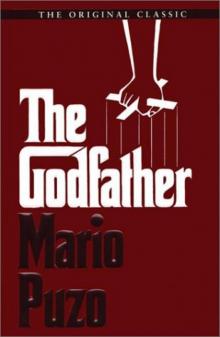 The Godfather
The Godfather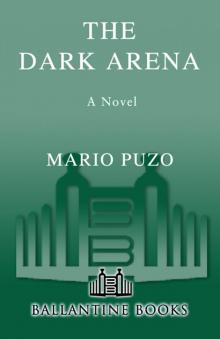 The Dark Arena
The Dark Arena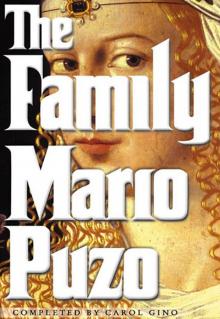 The Family
The Family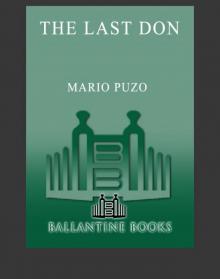 Last Don
Last Don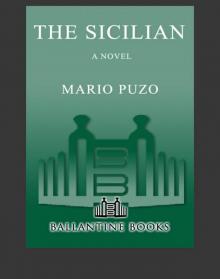 The Sicilian
The Sicilian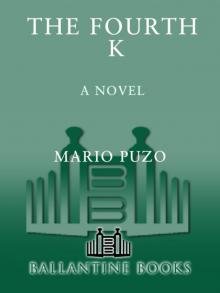 The Fourth K
The Fourth K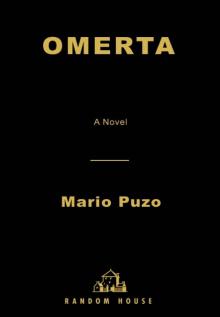 Omerta
Omerta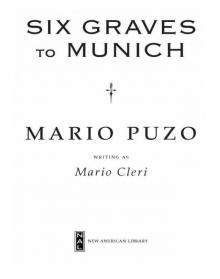 Six Graves to Munich
Six Graves to Munich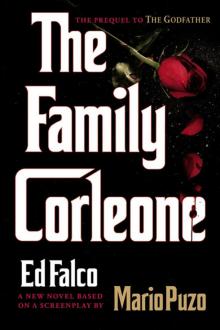 The Family Corleone
The Family Corleone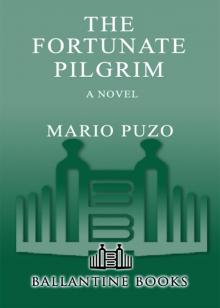 The Fortunate Pilgrim
The Fortunate Pilgrim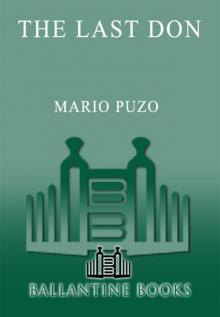 The Last Don
The Last Don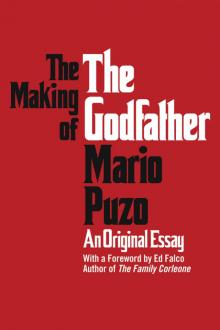 The Making of the Godfather
The Making of the Godfather Fools die
Fools die The Sicilian (v2.0)
The Sicilian (v2.0)